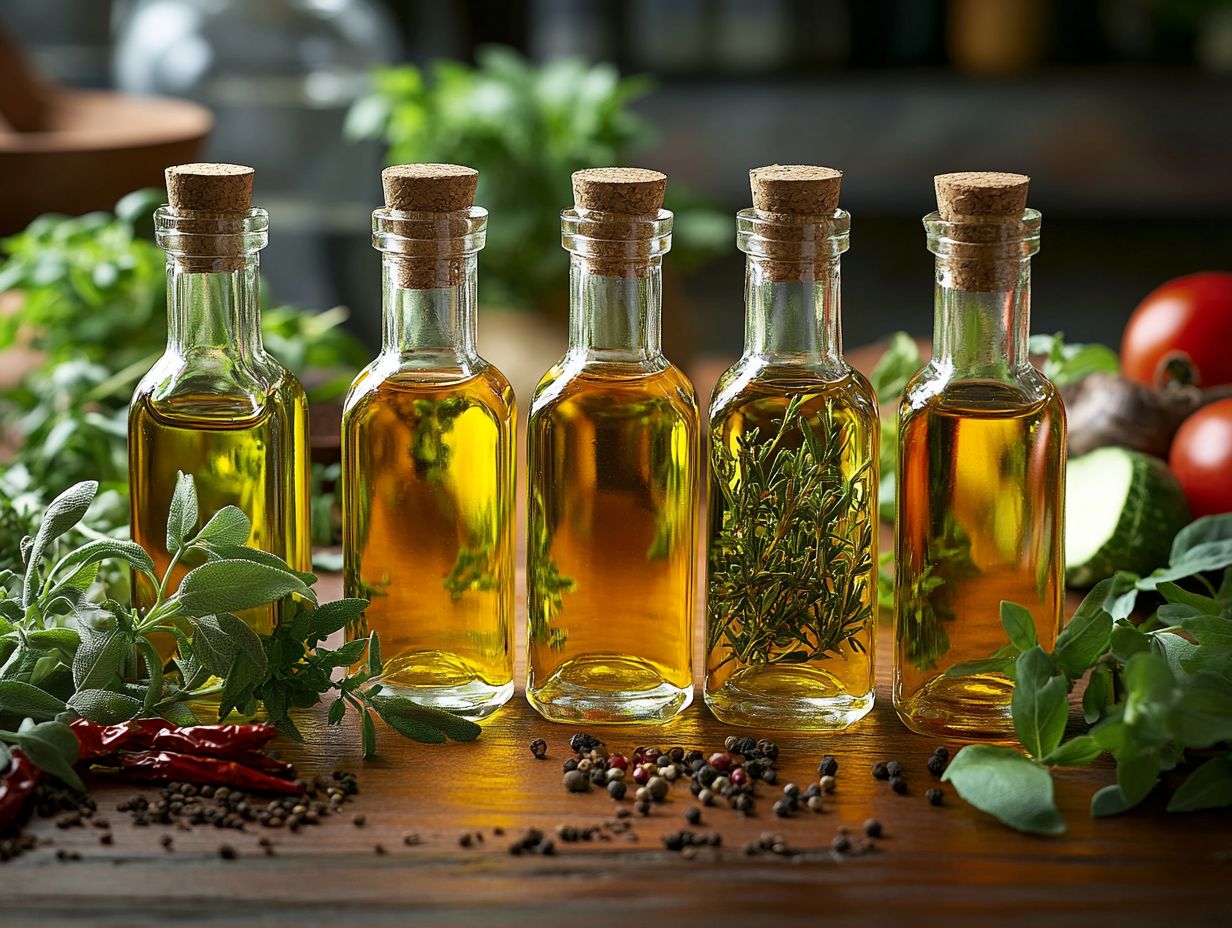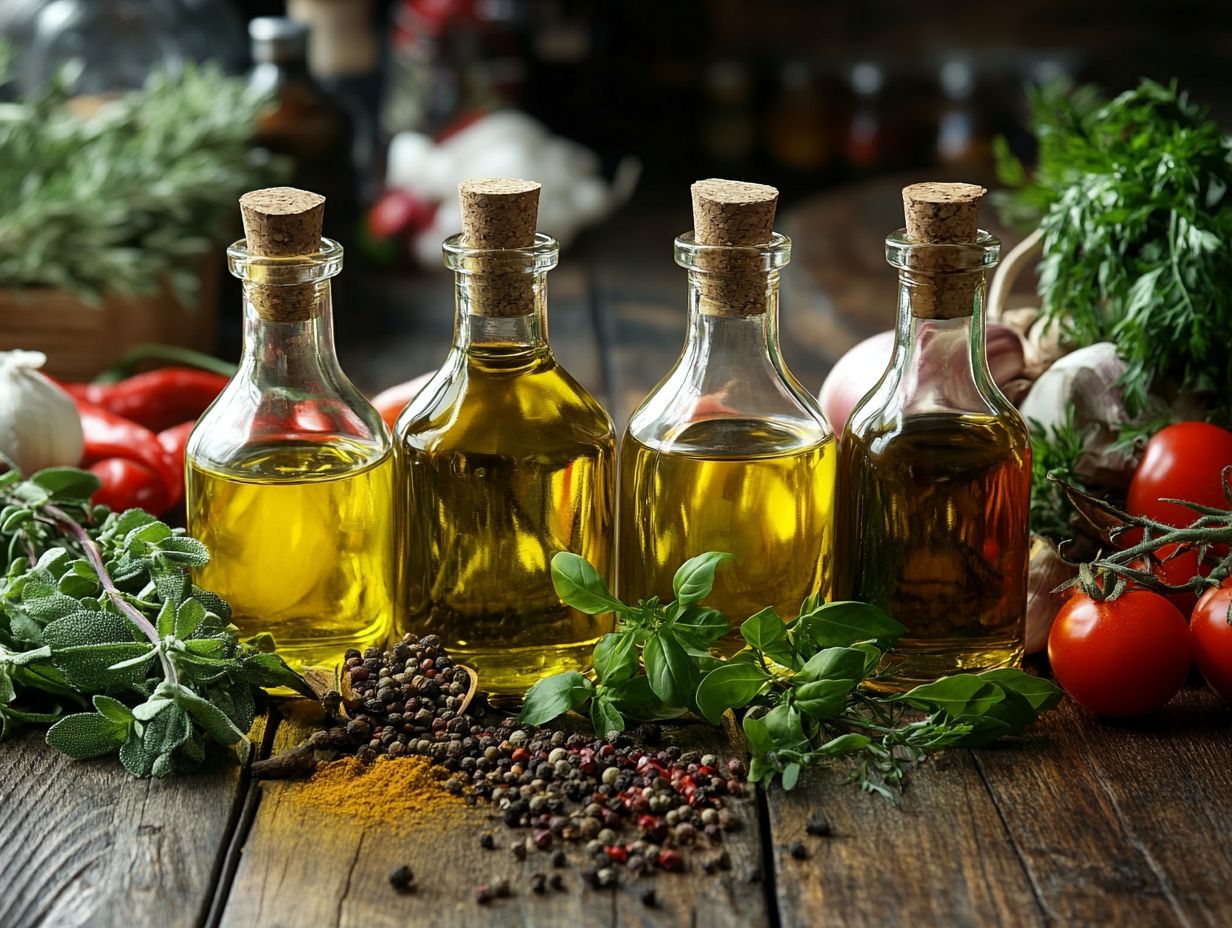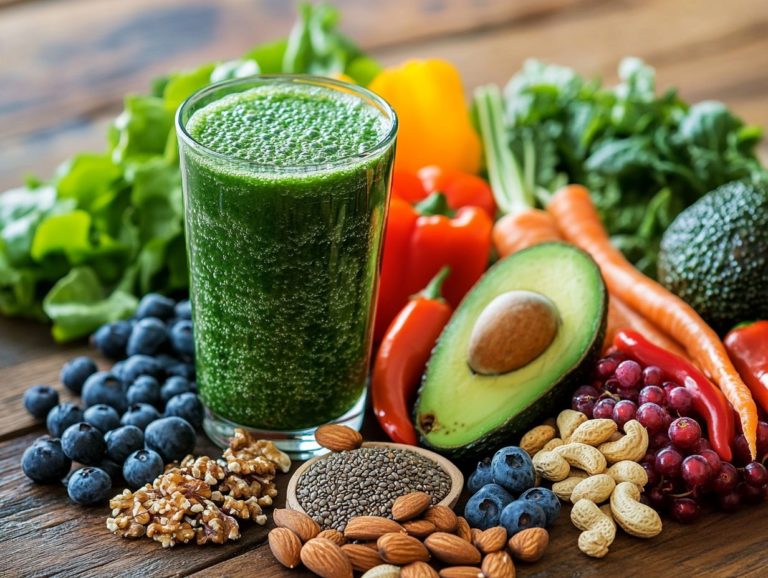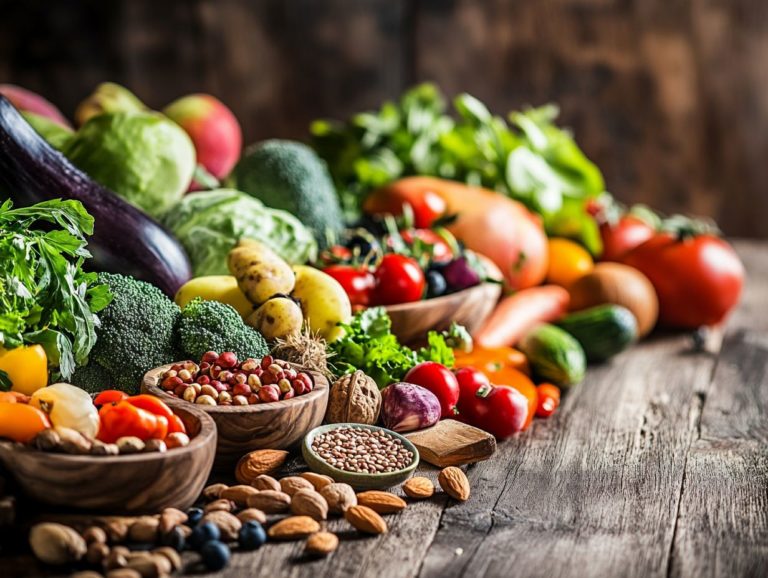5 Best Cooking Oils for Holistic Cooking
Choosing the right cooking oil can elevate not only your dishes but also your overall health.
Consider these five exceptional oils to enhance your culinary creations:
- Olive oil
- Coconut oil
- Avocado oil
- Ghee
- Sesame oil
Each of these oils offers distinct benefits and flavors, enriching your meals while supplying essential nutrients.
You’ll explore how to incorporate these oils into your diet, uncover potential risks, and discover delectable recipes that are sure to impress.
Unlock the delicious potential of these oils and elevate your cooking experience!
Contents
Key Takeaways:

Olive oil is a versatile and heart-healthy option for holistic cooking. It contains healthy fats and antioxidants that can benefit overall health.
Coconut oil is a popular choice for holistic cooking due to its high smoke point. It may promote healthy digestion and skin.
Avocado oil is rich in healthy fats and vitamin E. It is great for holistic cooking and promoting healthy skin and hair.
1. Olive Oil
Olive oil is a cornerstone of the Mediterranean diet, celebrated for its rich flavor and versatility. It also offers impressive health benefits.
With a high content of healthy fats and antioxidants, it combats free radicals, potentially enhancing heart health and reducing inflammation.
The meticulous extraction process ensures that its vital nutrients remain intact, making it an outstanding choice for healthy cooking.
Research from the American Heart Association shows that incorporating olive oil into your diet can significantly lower your risk of heart disease.
Drizzling extra virgin olive oil on salads or finishing roasted vegetables elevates the dish’s taste. In contrast, refined olive oil shines in high-heat cooking scenarios.
Understanding the difference between extra virgin (cold-pressed and unrefined) and refined olive oils (processed and possibly nutrient-losing) is crucial for maximizing both health benefits and culinary applications.
Brands like Kosterina Greek Olive Oil are noteworthy for their quality and flavor, making them favorites among health-conscious consumers.
2. Coconut Oil
Coconut oil is celebrated for its distinct flavor and rich saturated fat content. When used in moderation, it can be advantageous.
This oil offers potential health benefits, including improved metabolism and enhanced heart health.
Refined coconut oil has a higher smoke point, making it ideal for frying and high-heat cooking.
Conversely, unrefined coconut oil preserves its natural aroma and flavor, perfect for baking and saut ing.
This versatility allows you to seamlessly incorporate it into various cooking methods, whether preparing a vibrant stir-fry or a decadent dessert.
Many health enthusiasts value its compatibility with popular dietary choices like ketogenic and paleo diets, which emphasize healthy fats.
3. Avocado Oil
Avocado oil is renowned for its impressive smoke point and abundance of healthy fats. It elevates flavors while providing significant nutritional benefits.
Packed with omega-3 fatty acids, it supports heart health and helps reduce inflammation.
This versatile oil is perfect for a myriad of culinary creations, especially vibrant salad dressings that can transform any meal.
Its ability to withstand high heat makes it an exceptional choice for frying and roasting, allowing healthy meal preparation without worrying about harmful compounds.
Brands like Chosen Foods emphasize quality and purity, ensuring their products are free from additives and GMOs.
Indulge in the wholesome goodness of avocado oil with every drop, making your healthy lifestyle enjoyable and effortless.
4. Ghee

Ghee, a rich clarified butter from India, is celebrated for its flavor and impressive smoke point, making it a superb cooking fat for various techniques. In moderation, this golden butter, mostly made of saturated fats, can offer unique benefits.
Making ghee involves gently simmering butter to eliminate moisture, transforming it into a golden, aromatic fat that elevates the flavor profile of any dish. This traditional method makes ghee incredibly versatile, especially in Indian cooking, where it shines in everything from saut ing vegetables to drizzling over dals and biryanis.
What sets ghee apart is its distinct fat composition; it consists primarily of short- and medium-chain fatty acids, which can be advantageous for energy. With its nutty flavor and potential health benefits, ghee emerges as a versatile and nutritious alternative, perfect for everyday meals and special occasions!
5. Sesame Oil
Sesame oil, with its distinctive flavor profiles, is a cornerstone in many Asian cuisines. It offers various cooking methods and is revered for its high antioxidant content and polyunsaturated fats, which are healthy fats that support overall health.
There are primarily two types of this versatile oil: toasted and light.
- Toasted sesame oil, characterized by its dark hue, is derived from roasted sesame seeds and boasts a rich, nutty flavor. This makes it perfect for drizzling over finished dishes, enhancing sauces, or incorporating into marinades.
- Light sesame oil, extracted from raw seeds, offers a more neutral taste and a high smoke point, which is the temperature at which oil starts to burn, making it an excellent choice for frying and saut ing.
Beyond its culinary uses, both oils are replete with powerful antioxidants that can help reduce inflammation and support heart health. By incorporating them into your balanced diet, you not only elevate the flavors of your meals but also promote your overall well-being.
How Do These Oils Benefit Holistic Cooking?
Incorporating healthy oils into your holistic cooking not only enhances the flavors of your dishes but also significantly boosts your overall health. These oils are packed with essential fatty acids, vitamins, and antioxidants, perfectly complementing your commitment to nutrient-dense ingredients. For instance, using 5 healthy fats for a holistic diet can echo the principles of the Mediterranean diet, celebrated for its multitude of health benefits.
Beneficial oils like olive, avocado, and flaxseed oil help prevent chronic diseases, promote heart health, reduce inflammation, and boost cognitive function. Choose oils that match your health goals.
- For example, olive oil is fantastic for cardiovascular health.
- Omega-3-rich oils, such as flaxseed oil, are great for supporting brain function.
Utilizing cooking techniques like saut ing, drizzling cold-pressed oils over your finished dishes, or incorporating them into dressings can help preserve their nutrients, maximizing their health benefits. By selecting the right oil tailored to your dietary needs, you foster a balanced approach to cooking that nourishes both your body and your palate.
What Are the Key Nutrients Found in These Oils?
- Monounsaturated fats
- Polyunsaturated fats
- Omega-3 fatty acids
- Omega-6 fatty acids
- Antioxidants
These elements work together to support heart health, reduce inflammation, and offer protective effects against free radicals. Take olive oil, for example it s packed with monounsaturated fats that help lower bad cholesterol levels and enhance your overall cardiovascular function. Flaxseed oil, on the other hand, is a powerhouse of omega-3 fatty acids, essential for brain health and lowering the risk of chronic diseases.
It’s vital to maintain a balance between omega-3 and omega-6 fatty acids in your diet, as an imbalance can lead to inflammation and a host of health issues. Incorporating oils like avocado oil, which contains both omega-3 and omega-6, can positively contribute to this balance while also providing additional nutritional benefits such as vitamins and minerals.
How Can These Oils Be Used in Cooking?

These oils can elevate your culinary experience across various cooking techniques. Whether you’re saut ing, roasting, or dressing salads, each oil contributes its unique flavor profile and nutritional benefits. Selecting the right one based on cooking temperatures can optimize health outcomes.
For instance, olive oil works wonders when saut ing vegetables at medium heat. It enhances their taste while preserving its beneficial properties. In contrast, avocado oil can handle higher temperatures, making it the ideal choice for roasting meats and vegetables. This allows those rich flavors to develop beautifully.
When whipping up salad dressings, consider flaxseed oil for its earthy notes and impressive omega-3 content. Remember to keep it raw to maintain its nutrient value. Pairing sesame oil with Asian-inspired dishes can take your flavors to the next level. Meanwhile, coconut oil adds a delightful sweetness to tropical recipes.
Knowing the right temperatures for these oils is essential! It can make all the difference in your healthy cooking. Overheating can lead to the breakdown of those precious healthy fats you aim to incorporate into your meals.
What Are the Potential Risks of Using These Oils?
While cooking oils provide many benefits, there are potential risks to consider especially when opting for refined oils over unrefined ones. Refining oils can strip away nutrients. It may also introduce unhealthy trans fats and high levels of saturated fats, which can affect cholesterol.
Changes in the oil’s structure can cause health issues, such as inflammation and an increased risk of heart disease. In contrast, unrefined oils, which undergo minimal processing, retain their natural antioxidants and nutrients. This supports better overall health.
Try using extra virgin olive oil or unrefined coconut oil in your dishes! However, remember that even the healthiest oils should be used in moderation. Striking a balance in your diet is crucial for achieving optimal health.
How Can One Incorporate These Oils into Their Diet?
Incorporating healthy oils into your diet is easier than you think! Simple options like using them for cooking, drizzling over salads, or mixing them into smoothies can turn these nutrient-rich fats into staples in your culinary repertoire.
To maximize the benefits of these oils, proper storage is key. Keep them in dark glass containers away from heat and light to extend their shelf life.
Adding these oils to your daily meals can be straightforward. Consider using olive oil to saut your vegetables or adding a splash of walnut oil to your oatmeal for an unexpected yet delicious twist.
Be mindful of your total fat intake. Replacing heavier dressings with lighter oil-based alternatives can provide a satisfying flavor boost without sacrificing your health.
What Are Some Delicious Recipes Using These Oils?
Exploring delicious recipes that incorporate these healthy oils can inspire you to create new culinary masterpieces. Showcasing their unique flavor profiles and health benefits makes healthy cooking not just nutritious but genuinely enjoyable.
Imagine drizzling robust extra virgin olive oil over fresh salads or savoring the subtle richness of avocado oil as it elevates saut ed vegetables. The versatility of these oils invites endless experimentation in your kitchen.
You can easily adapt traditional recipes like swapping butter for coconut oil in baked goods to craft lighter, healthier versions without compromising on flavor.
Incorporating oils like sesame can introduce an Asian twist to your classic stir-fries, while a splash of flaxseed oil can add a delightful nutty flavor and a boost of omega-3 fatty acids to your smoothies.
Get creative! Use these oils to turn your everyday meals into gourmet dishes.
Frequently Asked Questions

What are the top 5 cooking oils for holistic cooking?
Coconut oil, olive oil, avocado oil, ghee, and sesame oil are the top choices for holistic cooking.
What makes these oils the best for holistic cooking?
These oils are unrefined and packed with nutrients. They also provide a good balance of omega-3 and omega-6 fatty acids.
How can coconut oil be used for holistic cooking?
Coconut oil is versatile. Use it for saut ing, baking, or even adding to smoothies.
Can olive oil withstand high heat for cooking?
Extra virgin olive oil isn t suitable for high heat due to its low smoke point. However, regular olive oil works well for saut ing and roasting at medium heat.
Why is ghee recommended for holistic cooking?
Ghee, or clarified butter, is popular in Ayurvedic medicine. It s nutrient-rich, easy to digest, and has a high smoke point.
Can sesame oil be used for more than just stir-frying?
Absolutely! Sesame oil is great for marinades, dressings, and even baking. It adds a delightful nutty flavor and is full of nutrients.






